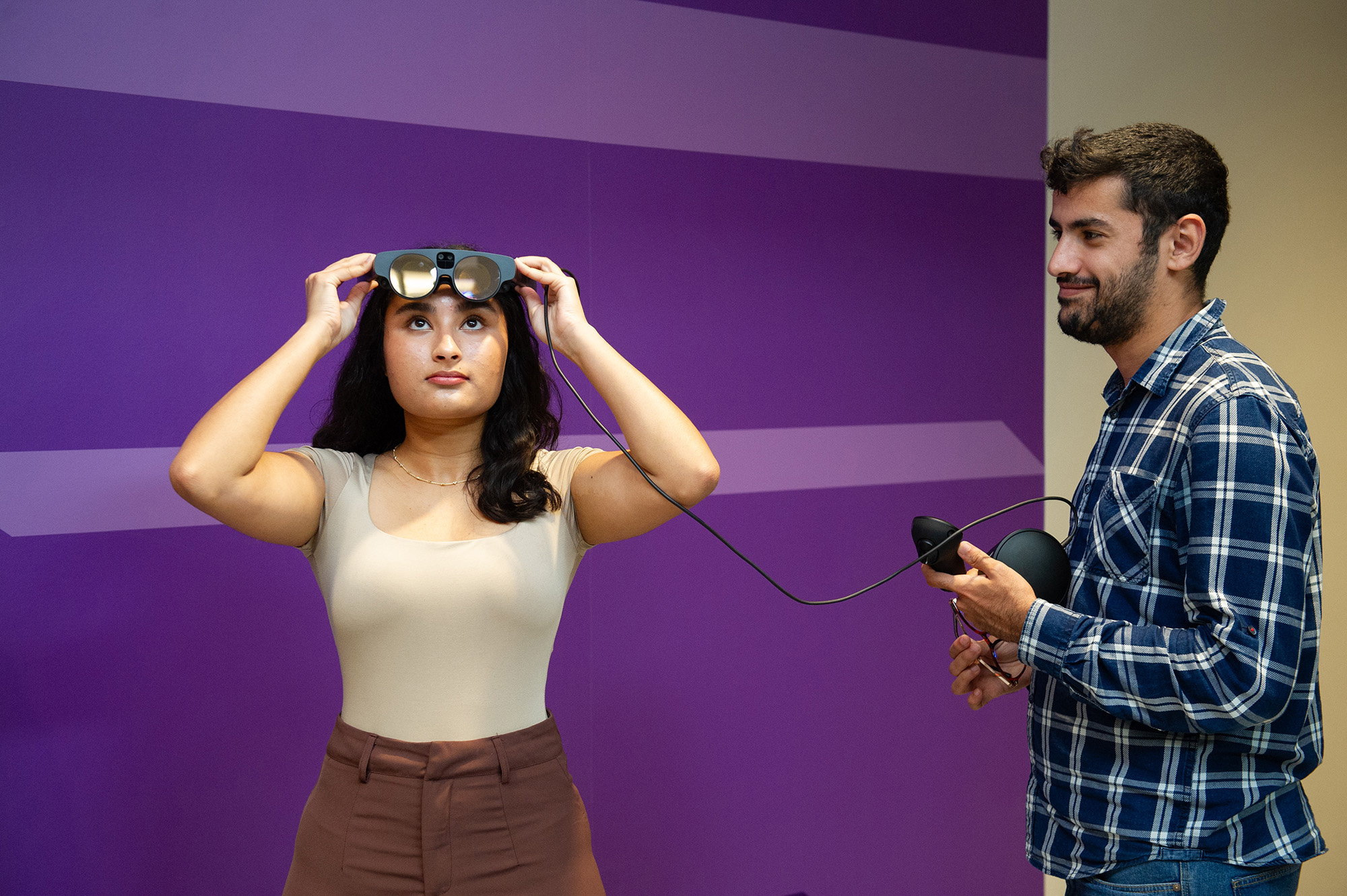LSU Graduate Protects U.S. Energy Industry, Joins Cybersecurity Team at Chevron
October 01, 2025
Meet Arushi Ghildiyal who recently graduated from LSU with a degree in cybersecurity at 20 years old and is now working for one of the nation’s best cybersecurity teams at Chevron.

Arushi Ghildiyal at the recent Silicon Bayou Gala, hosted by the LSU Division of Computer Science & Engineering.
Last year around this time, LSU alumna Arushi Ghildiyal from Dallas, Texas, walked into her first hardcore hacking class at LSU, Software Vulnerabilities and Exploitation. There, she realized her passion for what’s known in the cybersecurity world as “red-teaming,” or going on offense to find weaknesses in networks, software, and hardware. Even before graduating with her bachelor’s degree in computer science with a concentration in cybersecurity from LSU in May, Ghildiyal was hired by Chevron. She’s now working as a cybersecurity defense analyst on their global cybersecurity incident response team out of Houston, Texas.
“I returned to the same company I interned with last summer, so I knew it’s a place where I want to work,” Ghildiyal said. “Chevron is an energy company, and energy runs America. Cybersecurity is incredibly important in the energy industry and has a larger role in that than you might think. If an attacker shuts down the energy industry, they shut down a lot of things for a lot of people—a lot could go wrong.”
“We work with Chevron’s team at Volexity and they are insanely skilled. The fact we have a student there fulltime right out of school is crazy.”
Andrew Case, director of research at Volexity, a cybersecurity firm specializing in threat intelligence and incident response, and industry liaison for cybersecurity at LSU since 2017
At LSU, Ghildiyal was able to finish her undergraduate degree in just three years by stacking opportunities. Earning an average of 18 course credits per semester—the equivalent of six classes—Ghildiyal put herself on the academic fast-track while also dedicating time to cyber research, service, and clubs to build her network and gain hands-on experience.
As a freshman, Ghildiyal helped LSU researchers Ibrahim “Abe” Baggili and Andrew Webb launch their project to secure virtual and augmented reality applications for U.S. military missions and training, funded by a $600K Defense Advanced Research Projects Agency, or DARPA, grant. That research recently led to a published paper at USENIX Security ’25. Also in her freshmen year, Ghildiyal served as an ambassador for the Society of Women Engineers at LSU.
“Getting involved in clubs was really important for me because I came from Dallas, so coming to LSU, I knew nobody,” Ghildiyal said. “Getting involved in the community really helped me stay motivated and make friends, and I also learned a lot about communication and leadership.”
Networking and “talking to everyone” at LSU career fairs earned her three offers for internships her first summer. She chose International Paper in Memphis, Tennessee, because it had the strongest cyber focus.
“That summer, I got a hands-on look at different types of potential exploits and vulnerabilities,” Ghildiyal said. “I was essentially making data more accessible for International Paper’s cybersecurity teams to better respond to different findings.”

As a freshman, Ghildiyal helped LSU researchers Ibrahim “Abe” Baggili and Andrew Webb launch their project to secure virtual and augmented reality applications for U.S. military missions and training, funded by a $600K Defense Advanced Research Projects Agency, or DARPA, grant. That research recently led to a published paper at USENIX Security ’25.
– Photo by Elsa Hahne
In her sophomore year, which also was her junior year, Ghildiyal joined the first cohort of students who were trained by LSU and the university’s industry partner TekStream to work in the LSU-hosted Security Operations Center, or SOC, which now protects almost all higher education in Louisiana from cyber threats. She also served as vice president of the Society of Women Engineers and as fundraising chair for Women in Computer Science.
“My most impactful class that year was Operating Systems,” Ghildiyal said. “The biggest thing I both liked and disliked was learning there’s no perfect design in operating systems. There’s no perfect solution. Everything just depends on what you want, and everything has security implications. You want peak performance? Great, but those speed gains will come with security tradeoffs. You want super secure? Sure, but stronger security checks and protections can increase overhead.”
As an incoming senior, Ghildiyal joined the LSU Cybersecurity Clinic to help secure small businesses in Louisiana, which also helped her get certified as a GIAC Certified Enterprise Defender. She also completed her pivotal internship with Chevron, where she helped increase cyberattack detection coverage and build an AI security assistant.
“I also helped set up another AI to help our teams respond faster,” Ghildiyal said. “I helped with their threat detection system—just consolidating everything and running gap analyses. We were able to identify blind spots where we were missing detections and test areas where we had detections that hadn’t been hit before.”
“In cybersecurity, it’s critical to have visibility into everything, so I was able to do some dashboarding as well,” Ghildiyal continued. “Just helping with triage to identify and respond more quickly to things.”
During her senior year, Ghildiyal served as president for Women in Computer Science, hosting the largest LSU hackathon ever in collaboration with the Security Society at LSU. She was also the LSU chapter lead for Women in Cybersecurity while hosting cyber workshops for other students (“Intro to Defensive Networking,” “Breaking into Cybersecurity: From Infosec to Ethical Hacking”) and competing in national capture-the-flag events (Penn State SillyCTF, WiCyS CTF, AWS Security Jam).
“In just a couple of years, Arushi went from walking into her first hacking class at LSU to defending one of the nation’s most critical industries at Chevron. Her success is proof that when talent meets opportunity, our students don’t just graduate, they lead, and they win.”
Abe Baggili, division chair of computer science and engineering in the LSU College of Engineering
Next Step
LSU's Scholarship First Agenda is helping achieve health, prosperity, and security for Louisiana and the world.


